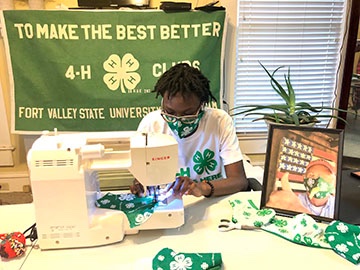The COVID-19 (coronavirus disease) pandemic is affecting all areas in the state of Georgia. The Georgia Department of Public Health provides daily updates on the total number of confirmed cases and deaths caused by the disease.
In Worth County, the spread of the virus to the Sylvester community caused Sam X, Fort Valley State University 4-H Healthy Living consultant, and 4-H members to spring into action. “When something occurs that affects the public, as leaders, you have to step up and figure out what moves need to be made and how to respond to what’s taking place,” X said.
After hearing about a shortage of masks for people serving on the front line, X and the 4-H’ers decided to help solve the problem. “We decided to lead from the rear by providing handmade masks to whomever we can. This includes people working in the hospitals, city workers, students and the elderly,” X said.
Janya Green, the National 4-H Council’s 2020 4-H Youth in Action Pillar Award for Agriculture recipient, is one of the 4-H’ers helping to solve the mask shortage. After failing to find masks for her grandparents in the stores, Janya and her mother wanted to make a difference. They decided to make a pattern for homemade masks and produce them using a sewing machine.
The Worth County High School junior said other 4-H members wanted to join in after seeing their efforts. “What we decided to do was to develop a virtual class for all of us,” Janya said. Using FaceTime on their iPhones, Janya said her fellow 4-H’ers discussed how to make the masks using different patterns and sizes for children and adults.
By design, the young group does not keep a tally of the masks they produce. “We don’t like to keep track of the number of masks we make because it takes the fun out of it and it becomes a competition. That’s not what we want,” Janya said.
X said once the 4-H members produce a number of masks for a group or organization, they pack them in boxes and deliver them to a designated spot. This is done to prevent spreading the virus through personal contact.
In addition to making masks, the 4-H’ers are learning to grow herbs and produce using raised garden beds. “We’re pushing self-sufficiency during the coronavirus,” Janya said. The 16-year-old said club members are building raised garden beds with materials found around the home. This includes items such as old dressers, tin, bricks and old racks that are not being used.
Janya, who is also a national spokesperson for 4-H, stresses the organization’s impact in her area. “4-H is the leader in every community. Without 4-H, this effort would not be taking place. As a whole, 4-H is like a family, and that family is taking care of this community during this crisis,” Janya said.
Woodie Hughes Jr., FVSU’s assistant Extension administrator state 4-H program leader, said 4-H’s response to COVID-19 reflects an example of caring, compassion and safety first.
“This particular pandemic is teaching youth the life skills of patience, endurance and adaptability. It also shows them how invaluable agriculture and natural resources are,” Hughes said.
For more information about FVSU’s 4-H Healthy Living program, contact Hughes at (478) 825-6296 or hughesw@fvsu.edu.

